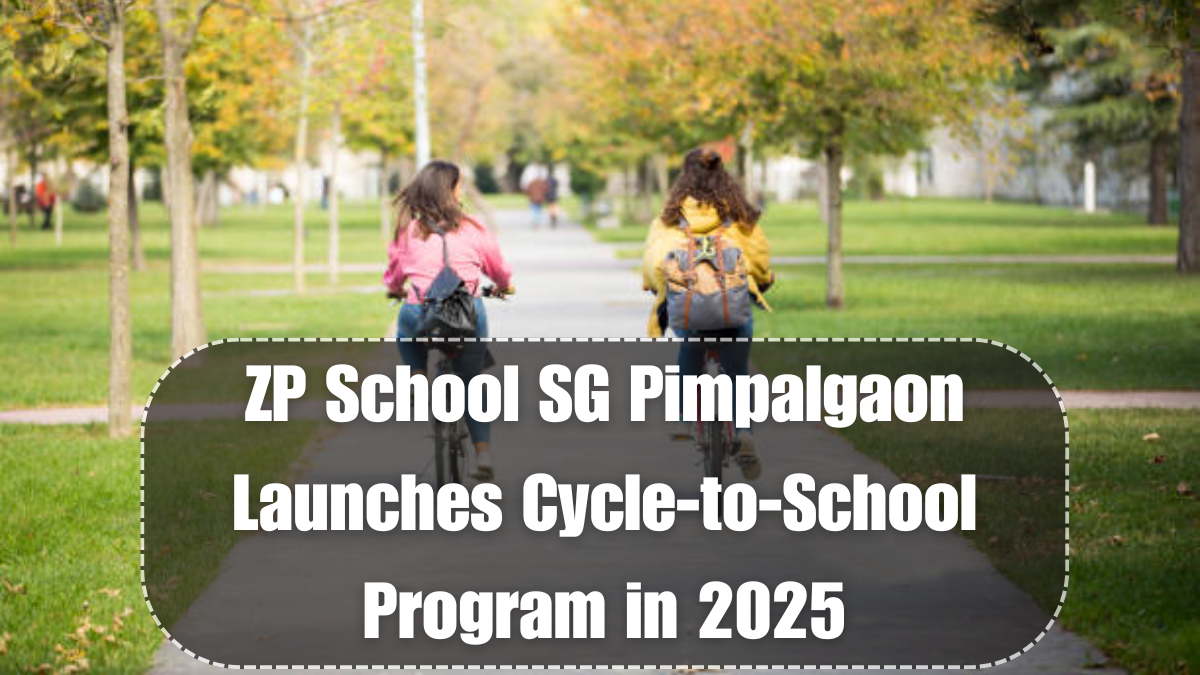The bicycle to school policy introduced at ZP School SG Pimpalgaon in 2025 is a groundbreaking initiative designed to promote environmental responsibility, student health, and traffic decongestion in rural areas. With a growing number of students commuting daily on foot or through unsafe transport methods, this new policy encourages the use of bicycles as the primary mode of travel for students within a 5 km radius of the school.
Launched in collaboration with the local Panchayat and supported by the Rural Development Department, the program has already distributed 150 bicycles to students from economically weaker backgrounds. The policy also includes safety gear distribution, cycle maintenance camps, and road safety orientation—creating a strong foundation for sustainable rural mobility.

Cycle policy with a multi-purpose impact
The new cycle policy is not only a move toward green transportation—it’s a multi-dimensional development tool. The program has had immediate benefits, including increased school attendance, improved student punctuality, and enhanced physical activity levels. The policy also encourages independence and confidence among young rural children.
Key features of the policy include:
-
Free bicycle distribution for girls and underprivileged students
-
Compulsory safety gear (helmets and reflectors)
-
Cycle parking zones inside the school campus
-
Monthly bicycle health checks and maintenance drive
-
Dedicated cycling tracks marked near the school premises
These well-thought-out actions are helping transform daily student travel into a model of eco school transport in India’s rural belt.
Eco school transport becomes a village-wide movement
With the success of the bicycle to school policy, the surrounding community has embraced the cycling culture. Parents are now riding bicycles with their children to nearby farms and markets. The Panchayat has begun upgrading internal roads to make them more cycle-friendly. Teachers, too, have joined in by riding bicycles on “No Vehicle Wednesdays,” promoting green education through practice.
Here’s a snapshot of the cycle-to-school program structure:
| Component | Description |
|---|---|
| Target Beneficiaries | Students living within 5 km of the school |
| Safety Gear Provided | Helmets, reflective jackets, bell accessories |
| Parent Participation | Cycle-to-school pledge signed by parents |
| Monthly Events | Fitness rides, quiz competitions, and rallies |
| Monitoring Committee | Teachers, parents, and Panchayat representatives |
Through such structured planning, the initiative isn’t just a policy—it’s a lifestyle upgrade for the entire village.
Rural mobility redefined through student-led change
The impact of this initiative is already visible on the roads of SG Pimpalgaon. Students are now riding in colorful, safe cycling groups to and from school. Morning assemblies begin with a review of cycling safety tips, and selected students are appointed as “Cycle Captains” to guide their peers and report any issues related to the route.
This rural mobility model is inspiring neighboring villages to replicate the structure, showing that sustainable change is possible with student leadership and community involvement. By reducing the dependence on motorized transport, this initiative has also cut down on local air and noise pollution.
Green education in motion
The green education angle of the bicycle to school policy lies in its holistic teaching method. Students learn about environmental benefits, carbon footprint, health impacts, and traffic rules not just in books—but by experiencing them daily. The initiative ties into subjects like Environmental Studies, Social Science, and Physical Education through practical applications.
ZP School SG Pimpalgaon is setting an excellent example of how small changes in school transport policy can lead to big transformations in community behavior. With its success, the school has now received recognition from the district administration and is being considered for a model pilot program across other Zilla Parishad schools.
FAQs
What is the bicycle to school policy at ZP School SG Pimpalgaon?
The bicycle to school policy is a rural student mobility initiative launched in 2025 to promote safe, pollution-free commuting using bicycles.
What does the cycle policy include?
The cycle policy includes free cycle distribution, safety gear, maintenance support, and awareness programs to encourage daily cycling to school.
How does this policy impact rural mobility?
It improves rural mobility by reducing dependence on motorized transport, increasing student attendance, and enhancing road safety awareness.
What is eco school transport?
Eco school transport refers to environmentally friendly travel methods like cycling or walking, integrated into school systems for sustainable living.
How is green education taught through this initiative?
The policy connects classroom learning to real-world practice, making green education a daily experience through cycling and environmental awareness.
Click here to know more.
